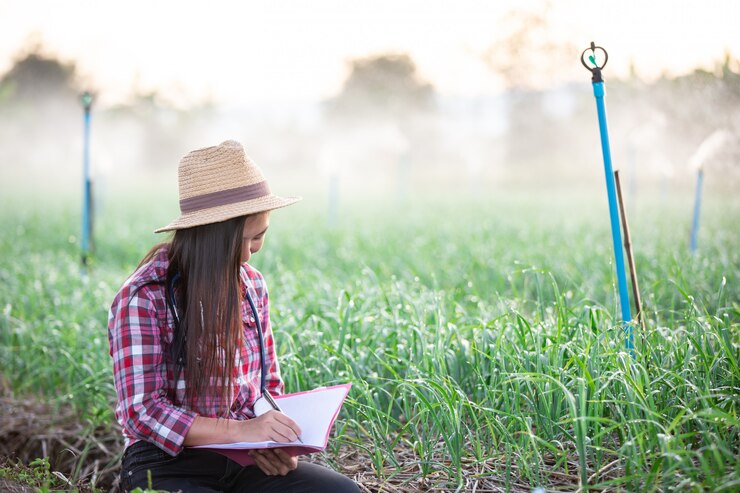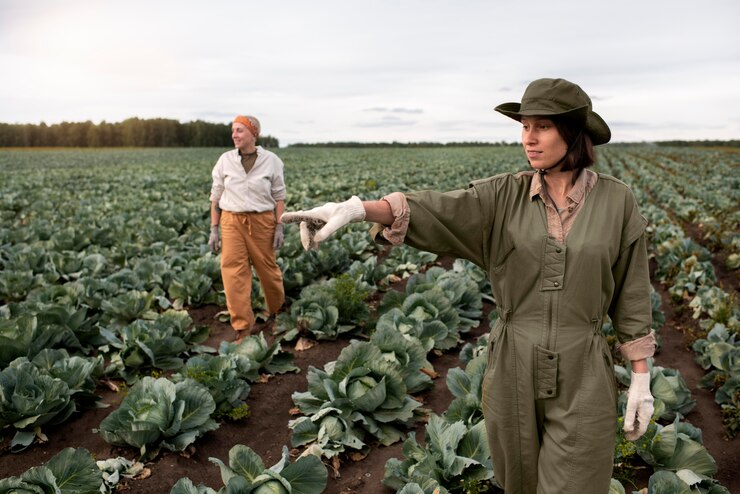Australia’s agricultural industry is not just about farming—it’s a dynamic sector filled with a variety of roles, from hands-on farming jobs to advanced research and technical positions. Agriculture plays a vital role in the Australian economy and provides a gateway to numerous career paths for local and international talent alike. Agriculture in Australia

Why Are Agricultural Jobs in Demand in Australia?
The demand for skilled workers in agriculture has surged significantly in recent years. This increase is driven by a blend of rising international demand for Australian products, advancements in agricultural technology, and sustainable farming practices aimed at addressing climate change and resource scarcity. For example, Queensland alone is projected to see agricultural employment rise by over 11% in 2024-25, yet many roles remain unfilled.
This growing demand has led to the emergence of new roles and skill sets in the agricultural sector. Technological advancements, particularly in precision agriculture, require specialized skills, shifting the demand toward more technically skilled professionals. Precision agriculture optimizes farming methods using technology like GPS, drones, and data analytics, aiming to boost productivity with minimal environmental impact.
Choosing a Career Path: What Are the Best Jobs in Agriculture?
The “best” job in agriculture depends on your interests, skills, and long-term goals. Here are some popular roles in Australia’s agricultural sector:
Agricultural Consultant:
Works with farmers and agribusinesses to improve crop yields, animal health, and sustainability.
Agricultural Scientist:
Conducts research on soil, crops, and environmental impacts to improve farming practices.
Farm Manager:
Oversees the day-to-day operations of farms, including crop and livestock management.
Horticulturist:
Specializes in cultivating fruits, vegetables, flowers, and ornamental plants.
Livestock Manager:
Focuses on animal welfare, breeding, and product quality in meat, dairy, or wool production.
Environmental Scientist:
Addresses the environmental impact of farming, promoting sustainable practices.
These roles are not only diverse but offer career progression, with certain areas such as agricultural technology, data analysis, and environmental management becoming increasingly significant as the industry modernizes.
Why Study Agriculture in Australia?
For students and graduates, Australia offers comprehensive agriculture programs tailored to industry needs. Degrees like those at the University of Southern Queensland (UniSQ) integrate practical industry experience, exposing students to current practices and potential employers during their studies. With strong industry connections and a curriculum shaped by real-world agricultural needs, these programs provide an advantage in the competitive job market.

Innovations Shaping Australia’s Agricultural Future
Australia’s agricultural sector has been a global leader in innovative farming techniques aimed at sustainability and resource efficiency. With climate change posing new challenges, the industry is investing in technologies that reduce environmental impact and preserve essential natural resources. Some of the latest innovations include:
Driverless Tractors:
These are now used to automate planting, harvesting, and other farming tasks, increasing efficiency.
Spot-Spraying Technology:
This method targets only the weeds with chemicals, minimizing pesticide use and reducing soil impact.
Biological Pest Control:
Farmers are using beneficial insects instead of chemical pesticides to manage pests, promoting a healthier ecosystem.
These innovations reflect a shift toward farming systems that are not only productive but also ecologically balanced, helping to preserve Australia’s unique natural assets, such as the Great Barrier Reef.
Ready to Start Your Career in Agriculture?
Australia’s agricultural industry offers a variety of paths for those passionate about sustainability, technology, and feeding the world. Whether you’re a student exploring degree options, or a professional seeking a career change, there are ample opportunities in this thriving sector.
For more information about studying agriculture in Australia and to learn about specific programs or career options, explore our resources and contact us at StudentVisaAustralia.com for free expert advice on how to start your agricultural journey in Australia.

6 Big Farming Industries in Australia
Australia’s agricultural landscape is vibrant and diverse, supporting a range of farming industries that fuel the economy and sustain livelihoods. Let’s take a closer look at six key sectors:
- Grain and Oilseed Production
- Australia is a global leader in grain production, with wheat, barley, and canola being the stars of this sector.
- Wheat, the country’s largest crop, finds its way to over 50 international markets, making it a staple export.
- The rolling golden fields, especially in Western Australia, highlight the importance of grain farming in both domestic and global markets.
- Livestock Farming
- The image of sheep grazing in the countryside is iconic in Australia.
- Australia is the world’s largest exporter of beef and mutton, with its livestock industry being a pillar of rural communities.
- Dairy farming is also a key contributor, producing high-quality milk, cheese, and butter that’s enjoyed worldwide.
- Horticulture
- From mangoes in the tropical north to apples in Tasmania, Australian horticulture is incredibly varied.
- Nuts like almonds and macadamias are gaining international acclaim, while the vegetable sector ensures a steady supply of fresh produce locally.
- Viticulture
- Australia’s wine regions, like the Barossa Valley and Hunter Valley, are globally recognized for their premium wines.
- Shiraz and Chardonnay are among the top grape varieties that have put Australian wines on the world map.
- Sugarcane Farming
- Sugarcane fields stretch across Queensland, forming the backbone of the Australian sugar industry.
- It’s not just about sweet treats—sugarcane byproducts are also used in bioenergy and ethanol production.
- Aquaculture and Fisheries
- With one of the longest coastlines in the world, Australia is a powerhouse in seafood farming.
- Prawns, oysters, and salmon dominate the aquaculture sector, while wild fisheries contribute to sustainable seafood supplies.
Types of Farming in Australia
Farming in Australia reflects the country’s diverse climate, soil, and geography. Here’s a breakdown of farming types across the nation:
- Dryland Farming
- Perfect for Australia’s arid and semi-arid regions, this practice involves growing drought-resistant crops like wheat, sorghum, and barley.
- Minimal water usage and innovative soil conservation methods define this farming style.
- Irrigated Farming
- In fertile river valleys like the Murray-Darling Basin, irrigation supports crops such as rice, cotton, and fruits.
- Advanced irrigation systems ensure water efficiency, even in water-scarce areas.
- Mixed Farming
- This versatile approach combines crops and livestock on the same property, enhancing productivity and sustainability.
- Farmers often rotate between grazing animals and planting cereals to maintain soil health.
- Horticultural Farming
- High-value crops like avocados, bananas, and berries are nurtured in specialized zones.
- Greenhouses and vertical farming are emerging trends within this category.
- Pastoral Farming
- With vast expanses of land in the outback, pastoral farms raise sheep and cattle on large scales.
- Some stations are so expansive they operate like small towns!
Australian Agriculture Statistics
Numbers don’t lie, and they tell a fascinating story of Australian agriculture:
- Economic Powerhouse: The sector contributes over $60 billion annually, driving exports and regional economies.
- Employment: Agriculture employs more than 250,000 people directly and supports countless others indirectly.
- Exports: Around 70% of farm produce is exported, feeding millions worldwide.
- Land Use: An impressive 55% of Australia’s total land area is used for agriculture.
Agriculture in Australia Facts
- Global Wool Leader: Australia is the top exporter of wool, primarily from its famous Merino sheep.
- Largest Organic Farmland: Australia has the most extensive area of certified organic land globally.
- Home of Innovation: Australian farmers lead in using drones, satellite data, and AI for precision farming.
- Nature’s Challenges: From bushfires to floods, Australian farmers are known for their resilience and adaptability.
Top 10 Crops Grown in Australia
- Wheat – The backbone of Australian agriculture and its largest crop export.
- Barley – Used for beer production and animal feed.
- Canola – A leading oilseed crop with health benefits.
- Sugarcane – A vital crop for sugar and ethanol industries.
- Cotton – Australia produces some of the highest-quality cotton globally.
- Grapes – Essential for wine and fresh fruit markets.
- Almonds – A booming industry, especially in southern regions.
- Potatoes – Grown across temperate regions for chips, fries, and fresh supply.
- Oranges – Loved for juice and fresh consumption.
- Rice – Grown in irrigated fields and meeting both local and export demands.
Farming in Australia for Visa
Farming isn’t just a way of life—it’s a gateway for international workers seeking opportunities in Australia.
- Working Holiday Visa (Subclass 417 and 462)
- Backpackers can extend their visa by completing farm work in rural areas.
- Roles range from fruit picking to packing, with experiences offering a glimpse into Aussie farm life.
- Skilled Migration Visas
- Farm managers, agronomists, and equipment operators are in high demand, creating pathways for skilled workers.
- Regional Visas
- These visas encourage individuals to settle in rural Australia while working in agriculture, offering permanent residency pathways.
- Seasonal Worker Program
- Open to Pacific Islanders and Timorese citizens, this program helps meet seasonal labor shortages on Australian farms.
Farming jobs are not only rewarding but also an excellent way to explore the beautiful Australian countryside while building your future.
Australia’s agriculture industry is more than just a source of food—it’s a testament to innovation, resilience, and sustainability. Whether you’re a curious traveler, a student, or someone seeking a fresh start, farming in Australia has something to offer for everyone.
Conclusion
Agriculture in Australia offers exciting career opportunities across a variety of fields, from hands-on farming roles to high-tech research and environmental management positions. The industry is rapidly evolving, and with the right skills and knowledge, you can find a fulfilling career that contributes to global food security and sustainable development.
This article provides general information and should not be considered professional or legal advice. While we strive to keep information accurate and up-to-date, visa requirements, job market conditions, and academic program details can change. For specific guidance tailored to your situation, please contact StudentVisaAustralia.com for a personalized consultation with our experts.
Source: insiderguides.com.au
Get Free Expert Advice: Are you ready to embark on your next adventure? Whether you’re seeking a work permit, tourist visa, or study opportunities in Canada or other countries, we’re here to help! Contact us today to learn how our expert services can simplify your journey and turn your dreams into reality. Reach out now and let’s start planning your future together!
- Canada vs. Australia: Which Country is Your Perfect Fit for Immigration in 2024?
- Navigating Student Visa Regulations for Studying in the US, UK, Australia, and Canada
- Your Canadian Immigration Journey: 10 Strategies to Raise Your CRS Score
Also read:
- Onshore Student Visa Application: Complete Guide for International Students in 2025
- Australia’s New Student Visa Rules in 2025 – Expert Tips for Indian Students
- How to Improve English & Communication Skills in Australia
- Top Tips for International Students in Melbourne: A Complete Guide
- Your Ultimate Guide to Pursuing an MBA in Australia – Everything You Need to Know





